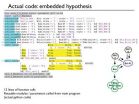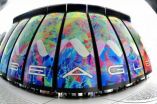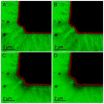(Press-News.org) Researchers at the San Diego Supercomputer Center at the University of California, San Diego, have developed software that greatly expands the types of multi-scale QM/MM (mixed quantum and molecular mechanical) simulations of complex chemical systems that scientists can use to design new drugs, better chemicals, or improved enzymes for biofuels production.
A paper outlining the research, titled 'An Extensible Interface for QM/MM Molecular Dynamics Simulations with AMBER' and conducted by members of the Walker Molecular Dynamics Lab (WMD) at SDSC, was featured on the cover of the January 15th issue of the Journal of Computational Chemistry.
Multi-scale QM/MM computational methods are crucial to advancing the understanding and solution to problems in the chemical sciences, ranging from drug design to renewable energies. This has been recognized with the award of the 2013 Nobel Prize in chemistry for the development of multi-scale models of complex chemical systems.
In QM/MM simulations, an accurate but computationally complex and thus time-consuming quantum mechanical model is used to identify important features of the electronic structure of a chemically relevant region. This is required, for example, to describe photo-physical processes or chemical reactions in the active site of enzymes. Effects of the surrounding environment are then included with a computationally less complex classical MM model.
"QM/MM simulations are computationally very demanding compared to purely classical MM simulations," said Ross C. Walker, an SDSC research professor and adjunct associate professor in UC San Diego's Department of Chemistry and Biochemistry. "Access to SDSC's Trestles and Gordon supercomputers and their fast turnaround times were essential to our work. We ran a large amount of jobs to test and validate our implementation at various stages, as well as a large-scale simulation to demonstrate a practical application."
"Our software enables QM/MM simulations with a variety of advanced quantum mechanical models, and by integrating it with the popular AMBER molecular simulation package, which is used by hundreds of academic and industrial research labs, we can reach a very large user base", said lead author Andreas W. Goetz, a research scientist with SDSC and expert in multi-scale modeling. "We're looking forward to many exciting applications that will help scientists in computational chemistry and biophysics understand and predict the behavior of molecular systems at a fundamental level."
INFORMATION:
Authors of the new study include SDSC's Goetz and Walker as well as Matthew A. Clark, who developed part of the software during his internship with Walker and Goetz, as part of SDSC's Research Experience for High School Students (REHS) program and later as an undergraduate research intern in the WMD lab.
SDSC team develops multi-scale simulation software for chemistry research
SDSC's trestles and Gordon Supercomputers used in development and validation
2014-02-20
ELSE PRESS RELEASES FROM THIS DATE:
Clutter cutter
2014-02-19
WASHINGTON D.C. Feb. 19, 2014 -- Life can be messy at all scales, requiring different organizational strategies -- from cleaning the house, to removing damaged or expired cells from the body to avoid cancer progression.
In a messy house, people use computers to manage paper and photo clutter; companies use computer systems to track their inventory. Now a team of researchers at Vanderbilt University in Nashville, Tenn., is taking a similar approach to cell-molecular inventory control for cancer. They have created computer models, using their programming framework (PySB), ...
Does more stress equal more headaches?
2014-02-19
PHILADELPHIA – A new study provides evidence for what many people who experience headache have long suspected—having more stress in your life leads to more headaches. The study released today will be presented at the American Academy of Neurology's 66th Annual Meeting in Philadelphia, April 26 to May 3, 2014.
For the study, 5,159 people age 21 to 71 in the general population were surveyed about their stress levels and headaches four times a year for two years. Participants stated how many headaches they had per month and rated their stress level on a scale of zero to ...
Insurance status may influence transfer decisions in trauma cases, Stanford study reveals
2014-02-19
STANFORD, Calif. — Emergency rooms are less likely to transfer critically injured patients to trauma centers if they have health insurance, according to a new study by researchers at the Stanford University School of Medicine.
The counterintuitive finding suggests that insured patients are more at risk for receiving sub-optimal trauma care than uninsured patients are.
Although a majority of severely injured trauma patients are initially taken to trauma centers, at least one-third are taken to non-trauma centers. In these cases, emergency room doctors must assess the ...
HPV vaccination is associated with reduced risk of cervical lesions in Denmark
2014-02-19
A reduced risk of cervical lesions among Danish girls and women at the population level is associated with use of a quadrivalent HPV vaccine after only six years, according to a new study published February 19 in the Journal of the National Cancer Institute.
Two HPV vaccines are currently available and have proven to be highly effective against HPV16/18-associated cervical cancer. One of these vaccines, a quadrivalent vaccine, was licensed in Denmark in 2006, and it was subsequently incorporated into general childhood vaccination programs for girls free of charge and ...
Whole genome analysis, stat
2014-02-19
Although the time and cost of sequencing an entire human genome has plummeted, analyzing the resulting three billion base pairs of genetic information from a single genome can take many months.
In the journal Bioinformatics, however, a University of Chicago-based team—working with Beagle, one of the world's fastest supercomputers devoted to life sciences—reports that genome analysis can be radically accelerated. This computer, based at Argonne National Laboratory, is able to analyze 240 full genomes in about two days.
"This is a resource that can change patient management ...
Study shows in vivo endomicroscopy improves detection of Barrett's esophagus-related neoplasia
2014-02-19
DOWNERS GROVE, Ill. – February 19, 2014 – New research shows that the addition of confocal laser endomicroscopy to high-definition white-light endoscopy enables improved real-time endoscopic diagnosis of Barrett's esophagus dysplasia (neoplastic tissue) by using targeted biopsies of abnormal mucosa to reduce unnecessary mucosal biopsies and potentially reduce costs. It may also positively influence patient care by changing the plan for immediate endoscopic management. The study appears in the February issue of GIE: Gastrointestinal Endoscopy, the monthly peer-reviewed scientific ...
RXTE reveals the cloudy cores of active galaxies
2014-02-19
VIDEO:
Zoom into the cloudy heart of an active galaxy. This animation shows an artist's rendition of the cloudy structure revealed by a study of data from NASA's Rossi X-Ray Timing...
Click here for more information.
Picture a single cloud large enough to span the solar system from the sun to beyond Pluto's orbit. Now imagine many such clouds orbiting in a vast ring at the heart of a distant galaxy, occasionally dimming the X-ray light produced by the galaxy's monster black ...
NuSTAR helps untangle how stars explode
2014-02-19
For the first time, an international team of astrophysicists, including Lawrence Livermore National Laboratory scientists, have unraveled how stars blow up in supernova explosions.
Using NASA's Nuclear Spectroscopic Telescope Array (NuSTAR) – a high-energy X-ray observatory - the international collaboration created the first-ever map of radioactive material in a supernova remnant, named Cassiopeia A, or Cas A for short. The findings reveal how shock waves likely rip apart massive dying stars, and ultimately end their lives.
A supernova is the cataclysmic death of a ...
REACT clinical trial supports new approach of accelerated treatment for Crohn's disease
2014-02-19
The final results from an international clinical trial involving nearly 2,000 patients with Crohn's disease support the use of a new management strategy referred to as accelerated step-care as a best practice for the care of active Crohn's disease. The REACT (Randomized Evaluation of an Algorithm for Crohn's Treatment) study, led by Robarts Clinical Trials at Western University (London, Canada) provides valuable new insights for community gastroenterologists which should benefit patients. The results of the study will be presented at the European Crohn's and Colitis Organisation ...
ORNL microscopy system delivers real-time view of battery electrochemistry
2014-02-19
OAK RIDGE, Tenn., Feb. 19, 2014 -- Using a new microscopy method, researchers at the Department of Energy's Oak Ridge National Laboratory can image and measure electrochemical processes in batteries in real time and at nanoscale resolution.
Scientists at ORNL used a miniature electrochemical liquid cell that is placed in a transmission electron microscope to study an enigmatic phenomenon in lithium-ion batteries called the solid electrolyte interphase, or SEI, as described in a study published in Chemical Communications.
The SEI is a nanometer-scale film that forms ...
LAST 30 PRESS RELEASES:
Molecular glue discovery: large scale instead of lucky strike
Insulin resistance predictor highlights cancer connection
Explaining next-generation solar cells
Slippery ions create a smoother path to blue energy
Magnetic resonance imaging opens the door to better treatments for underdiagnosed atypical Parkinsonisms
National poll finds gaps in community preparedness for teen cardiac emergencies
One strategy to block both drug-resistant bacteria and influenza: new broad-spectrum infection prevention approach validated
Survey: 3 in 4 skip physical therapy homework, stunting progress
College students who spend hours on social media are more likely to be lonely – national US study
Evidence behind intermittent fasting for weight loss fails to match hype
How AI tools like DeepSeek are transforming emotional and mental health care of Chinese youth
Study finds link between sugary drinks and anxiety in young people
Scientists show how to predict world’s deadly scorpion hotspots
ASU researchers to lead AAAS panel on water insecurity in the United States
ASU professor Anne Stone to present at AAAS Conference in Phoenix on ancient origins of modern disease
Proposals for exploring viruses and skin as the next experimental quantum frontiers share US$30,000 science award
ASU researchers showcase scalable tech solutions for older adults living alone with cognitive decline at AAAS 2026
Scientists identify smooth regional trends in fruit fly survival strategies
Antipathy toward snakes? Your parents likely talked you into that at an early age
Sylvester Cancer Tip Sheet for Feb. 2026
Online exposure to medical misinformation concentrated among older adults
Telehealth improves access to genetic services for adult survivors of childhood cancers
Outdated mortality benchmarks risk missing early signs of famine and delay recognizing mass starvation
Newly discovered bacterium converts carbon dioxide into chemicals using electricity
Flipping and reversing mini-proteins could improve disease treatment
Scientists reveal major hidden source of atmospheric nitrogen pollution in fragile lake basin
Biochar emerges as a powerful tool for soil carbon neutrality and climate mitigation
Tiny cell messengers show big promise for safer protein and gene delivery
AMS releases statement regarding the decision to rescind EPA’s 2009 Endangerment Finding
Parents’ alcohol and drug use influences their children’s consumption, research shows
[Press-News.org] SDSC team develops multi-scale simulation software for chemistry researchSDSC's trestles and Gordon Supercomputers used in development and validation




